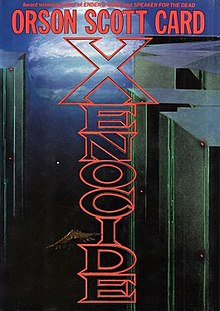Xenocide
This article has multiple issues. Please help improve it or discuss these issues on the talk page. (Learn how and when to remove these messages)
|
 Cover of first edition (hardcover) | |
| Author | Orson Scott Card |
|---|---|
| Cover artist | John Harris[1] |
| Language | English |
| Series | Ender's Game series |
| Genre | Science fiction |
| Published | 1991 (Legend), 1992 (Tor Books) |
| Publication place | United States |
| Media type | Print (Hardcover, Paperback & ebook) |
| Pages | 592 |
| 813/.54 20 | |
| LC Class | PS3553.A655 X46 1991 |
| Preceded by | Speaker for the Dead |
| Followed by | Children of the Mind |
Xenocide (first published in 1991) is the third book in the Ender's Game series, a science fiction series by American author Orson Scott Card.[2] Published during a period of increasing globalization and heightened awareness of cultural differences, Xenocide explores themes of communication, xenophobia, and the potential dangers of advanced technology.
Xenocide was nominated for both the Hugo Award and Locus Awards for Best Novel in 1992.[3]
Background
[edit]Card incorporated elements of an earlier published story, Gloriously Bright, from the January 1991 issue of Analog Science Fiction and Fact, into the novel.
Xenocide refers to the "killing or attempted killing of an entire alien species."[4]
'Xeno-' comes from the Greek word for "stranger, foreigner, or host;"[5][6]
'-cide' is a word-forming element meaning "killing." From French -cide, and from Latin -cidium "a cutting, a killing."[7][8]
Plot summary
[edit]This section has multiple issues. Please help improve it or discuss these issues on the talk page. (Learn how and when to remove these messages)
|
A book-length plot description (an additional 1800 words, 11,578 characters)
| |||||||||||||||||||
|---|---|---|---|---|---|---|---|---|---|---|---|---|---|---|---|---|---|---|---|
Lusitania[edit]Following the events of Speaker for the Dead, the novel portrays a complex ecosystem on Lusitania inhabited by humans, the small, pig-like Pequeninos, and the Hive Queen. This fragile peace is threatened by the Descolada virus, a crucial element in the Pequeninos' life cycle but lethal to humans. The Starways Congress's decision to destroy Lusitania to prevent the virus's spread highlights the central conflict of the novel: the potential for fear and misunderstanding to lead to drastic and irreversible actions. This resonates with historical instances of environmental destruction and species extinction caused by human actions, prompting reflection on the ethical implications of prioritizing human safety over the preservation of other life forms. The growing environmental movement of the late 20th century, with its emphasis on biodiversity and ecological interconnectedness, provides a relevant context for understanding the novel's exploration of these themes. The concept of interconnected ecosystems gained prominence during this period, influencing scientific understanding and public awareness of environmental issues.
(Remainder of plot summary omitted for brevity, as instructed) |
Reception
[edit]Xenocide received recognition in the science fiction community with nominations for the Hugo Award and the Locus Award for Best Novel in 1992.[3] These nominations highlighted the novel's significant impact and valuable contribution to the genre, highlighting its nuanced exploration of complex themes and meaningful engagement with contemporary social and political issues, which resonated profoundly with readers and critics. The novel’s emphasis on communication barriers and the difficulties in understanding alien cultures aligned closely with the growing interest in cross-cultural communication and the multifaceted challenges of globalization during this era. Furthermore, the rise of the internet and expanding global connectivity heightened the relevance of these themes, emphasizing the critical importance of fostering understanding and effective communication across diverse cultures.
The New York Times Book Review offered a mixed assessment of Xenocide in 1991.[2] While acknowledging the ambitious scope of the novel's philosophical explorations, the review also criticized its pacing and dialogue, suggesting that the complex ideas presented might have been more effective in a shorter format. This critique points to a common challenge in science fiction: balancing intricate world-building and philosophical depth with engaging narrative and character development. This tension between intricate ideas and accessible storytelling frequently emerges in critical discussions of science fiction, emphasizing the difficulty of engaging a broad audience while tackling complex and often abstract themes. The review's recognition of the novel's ambition and its critiques indicate that Xenocide generated significant debate about the role and purpose of science fiction. It prompted reflections on the genre's ability to delve into profound philosophical and social questions while still delivering compelling entertainment. This ongoing discourse mirrors the evolution of science fiction as a literary form, balancing its dual objectives of entertaining readers and addressing intricate societal challenges.
See also
[edit]References
[edit]- ^ Harris, John. Illustrator. Xenocide. By Orson Scott Card. Tor, 1991.
- ^ a b "The New York Times: Book Review Search Article". archive.nytimes.com. Retrieved August 6, 2024.
- ^ a b WWE Staff (July 21, 2024). "1992 Award Winners & Nominees". Worlds Without End. Tres Barbas, LLC. Archived from the original on August 14, 2009. Retrieved July 15, 2009.
- ^ Prucher, Jeff (2024) [2006]. "Xenocide". The Oxford Dictionary of Science Fiction. Oxford, England: Oxford University Press. doi:10.1093/acref/9780195305678.001.0001. ISBN 9780199891405. Retrieved July 21, 2024.
- ^ Harper, Douglas & Etymonline Staff (2024). "xeno-". Etymology Online. Retrieved July 21, 2024.
- ^ OED Staff (2024). "xeno-". OED.com. Oxford, England: Oxford University Press. Retrieved July 21, 2024.
- ^ Harper, Douglas & Etymonline Staff (2024). "-cide". Etymology Online. Retrieved July 21, 2024.
- ^ OED Staff (2024). "-cide". OED.com. Oxford, England: Oxford University Press. Retrieved July 21, 2024.
External links
[edit]- About the novel Xenocide from Card's website
- Xenocide title listing at the Internet Speculative Fiction Database
